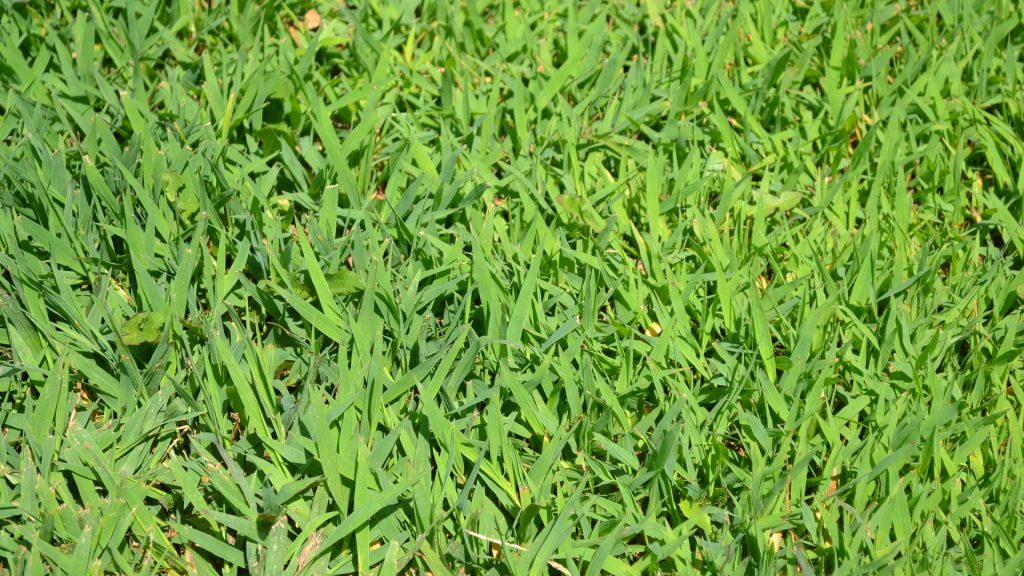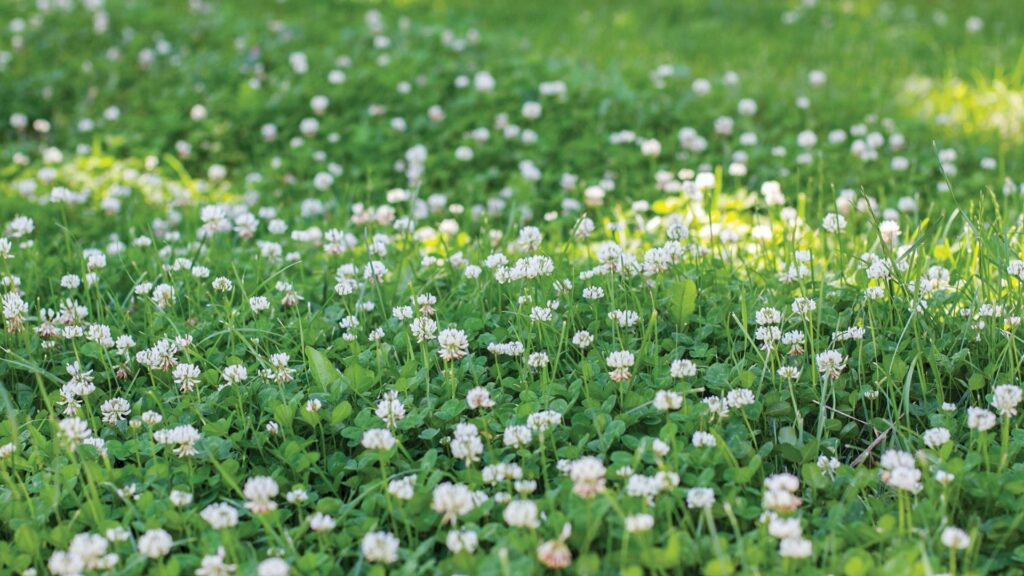
How To Get Rid Of Clover In Lawn
Don’t like what clovers are doing to your beautiful lawn? You’re not alone!
How to remove clover from your lawn?
These perennials can cover patches or even spread across a significant portion of your well-manicured lawn. The result is nothing short of unsightly for many homeowners. There are a handful of methods you can use to eliminate this peskiness naturally. These methods do not involve the use of harsh chemicals, yet they are very effective.
Thankfully, you are reading this and will learn how to get rid of clover in the lawn without damaging your turfgrass. Let set the ball rolling.
Clovers Aren’t That Bad
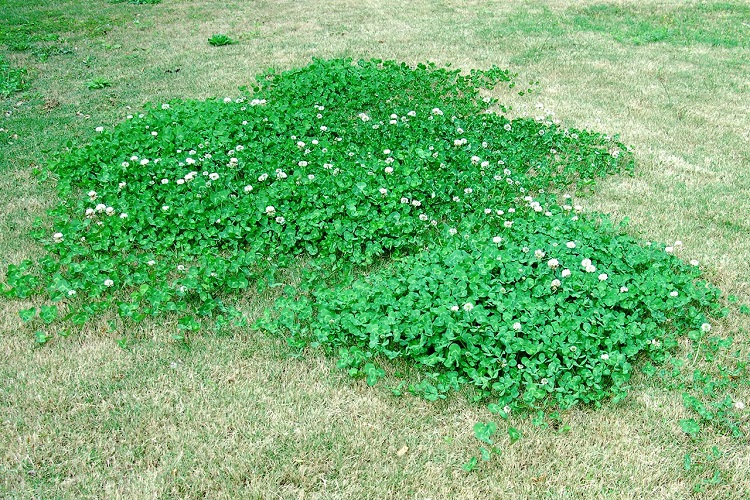
Many homeowners these days find clovers on their lawns very annoying.
But clovers aren’t always considered pesky weeds.
Before you research ways to get rid of these clovers, it might interest you to know that clovers can be beneficial to your lawn in more ways than one.
For example, they fix nitrogen deficiency in the soil and give your turfgrass a more fertile ground to thrive. Plus, clovers can choke out other weeds!
There is absolutely nothing wrong with clovers, at least, not until a few decades ago when they became victims of bad branding.
In a bid to market broadleaf herbicides, chemical companies cleverly convinced homeowners to adopt a clover-free lawn as the new standard.
Here are some reasons you shouldn’t think of clovers as pests.
- If you are tired of putting in extra time to care for your lawn, consider switching to clovers or some clover seeds alongside grasses. When you overseed your lawn with clovers, it helps retain the turfgrass look and you will get the full benefits of clovers.
- Less water is required for clovers than the traditional turfgrass. This makes it less stressful and saves precious time in watering your lawn.
- Clovers need less mowing, although this depends on how you want your lawn to look. Mowing clovers a few times during the growing season is okay but not compulsory. Allowing clovers to grow long can make your lawn adorable.
- Depending on your region, clovers are can be evergreen or semi-evergreen. They can retain their colors all through the summer and can surely stay green all year round if the winter season isn’t super cold.
- Clovers can effectively choke out weeds growing in your lawn. They have denser roots that result in rapid growth. It won’t be too long before they suffocate weeds naturally.
This means there is little to no need for applying any pre-emergent or post-emergent herbicide on your lawn. However, if you have any reason to use herbicides, it is important to steer clear of broadleaf herbicide on clovers. You don’t want to damage your grass in a bid to kill off clovers.
How to Get Rid of Clovers in Your Lawn
Some homeowners aren’t particularly bothered with clover growth in their lawns. But to others, it completely mars their beautiful green lawn and it is just inappropriate.
If that’s you, there are a handful of methods you can use to eliminate this peskiness naturally. These methods do not involve the use of harsh chemicals, yet they are very effective.
This is good lawn care practice, especially if going green is what you want.
Follow these simple steps on how to get rid of clover in lawn.
Deprive it of Sunlight and Oxygen

All plant life, including clover, need sunlight and oxygen to grow. Depriving them of this will naturally kill them.
To do this, use a garbage bag or plastic sheeting to cover the patch where the clovers grow. Be sure to properly secure the corners with heavy rocks so it stays in place.
This method will get rid of the clover in a few weeks. The downside? It will also kill any grasses under the plastic bag.
Pull Out the Clover By Hand
Use a garden spade to gently loosen the soil, tug the clover out from the root, and make sure all the roots are out. Leaving any behind will encourage regrowth.
Pulling out by hand is only practical for small patches.
Use Vinegar Solution
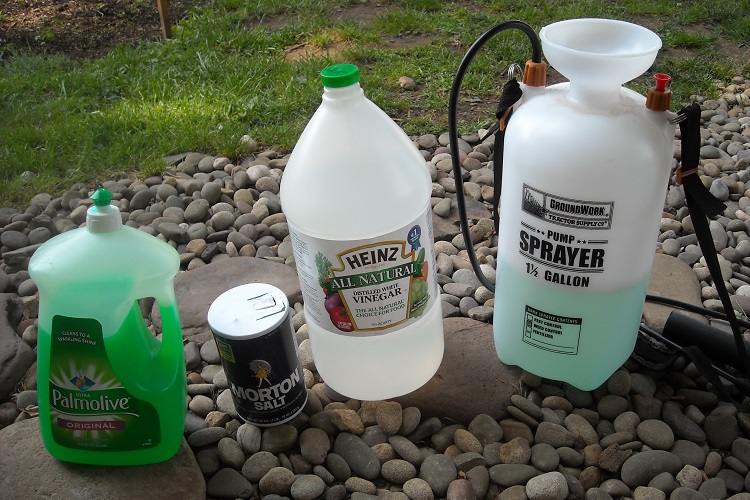
This home remedy can be used to produce a non-toxic clover killer.
A cup of water, some drops of dishwashing liquid, and a cup of vinegar are all you need.
Mix the ingredients properly in a container and spray it on any patches of clover. The dish wash will make sure the mixture sticks to the clover and vinegar will dry out the leaves.
This process can take up to a few weeks to completely kill the clover, so you may need to spray the mixture more than once.
When spraying, you will have to be careful because the solution can damage any grass it comes in contact with.
Use Organic Herbicide
Selective organic herbicides, such as A.D.I.O.S can be applied on clovers.
It will kill the unwanted plant without harming the surrounding grass.
How to Prevent Clovers
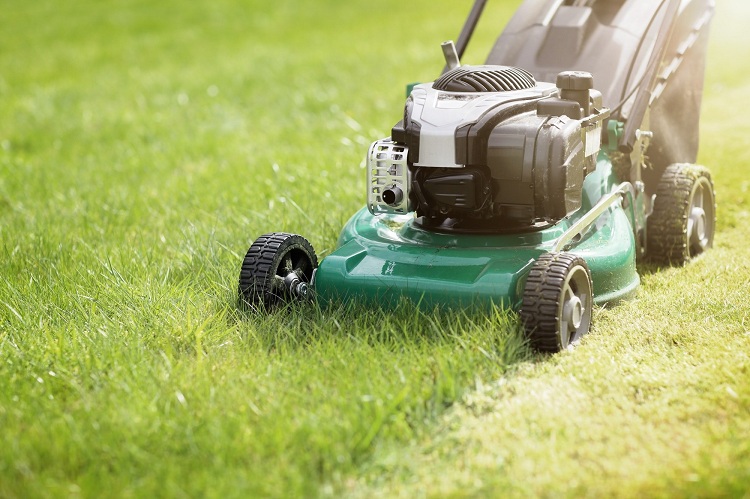
Now that we’ve seen how to get rid of clover in lawn, let’s focus on how to prevent it from growing in your lawn, in the first place.
Here are some simple, natural ways to prevent clover growth.
Mow Grass High
The best condition for clovers to grow is in grasses lesser than 3 inches tall. This makes it easier for them to spread around the lawn.
Clovers are less likely to do well if you mow your lawn high. That’s because the taller your grasses are, the better the chances of out-competing any clovers growing on your turf.
Use Corn Meal Gluten
Cornmeal Gluten releases organic peptides into the soil which helps prevent the growth of clovers. This method is safe because it won’t destroy nearby grasses.
But there’s a catch. Cornmeal gluten will not work if you already have clovers growing on your lawn. The method only prevents new seeds from sprouting.
For this reason, it is best not to use this method if your lawn is recently reseeded. Want to learn more about reseeding? Read our guide on the Best Time To Reseed Lawn.
Use Organic fertilizer
Organic fertilizers like bone meal, blood meal, cow manure, guano, liquid kelp, and earthworm castings will boost healthier lawn growth with time.
Some homeowners prefer going the traditional route by choosing fast-release fertilizers. This is usually because synthetic fertilizers cost less and can boost quick grass growth.
But using organic fertilizer will make your lawn a lot healthier.
Although it is usually slow-release, organic fertilizers are rich in nitrogen and effectively prevent clovers from growing in your lawn.
How to Prevent Clover Sprouting
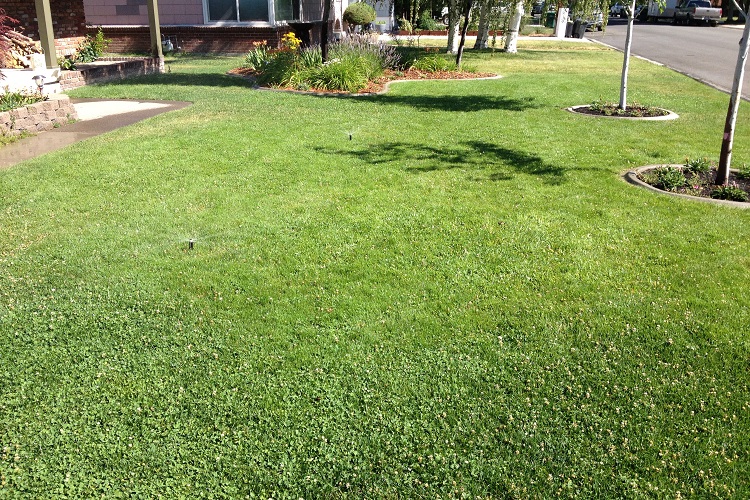
You can learn how to get rid of clover in lawn using natural or synthetic methods. Yet, clover is stubborn (but beneficial) and will likely grow back.
To prevent it from sprouting, you have to first understand how clover sprouts.
The dense groundcover typically flourishes when the growing conditions in your lawn are more favorable to weed than grass.
For example, clover will thrive on lawns with low nitrogen levels. Also, keep in mind that clover is perennial.
That means if it shows up during one particular growing season, chances are, it will come back the next year. So, what exactly are the growing conditions that allow clover to sprout despite of your best efforts?
Here’s why clover keeps growing back on your lawn and how to prevent it from sprouting.
Wrong Soil pH
The ideal soil pH for most lawns is anywhere between 6.0 and 7.0. If the acidity of your lawn soil is very high, your turf will find it difficult to grow. But guess what?
That’s a very suitable condition for clovers to thrive!
Pro tip: Use lime as a soil amendment to balance your lawn’s pH.
Compacted soil
When the soil is compacted, it prevents your lawn grass from getting enough air, the right amount of water, and adequate nutrients like nitrogen.
And since clover fixes nitrogen in the soil, a tough growing condition like compact soil is a good sprouting ground for the plant.
Pro tip: Break up compacted soil using a spike or core aerator. For more information, read our guide on How To Aerate Lawn By Hand.
Poor nitrogen levels
Fast-action fertilizers are good but can cause your soil to become low in nitrogen if used excessively.
Poor nitrogen levels in the soil create a very good condition for clover to sprout. The plant will absorb nitrogen from the air to create its own fertilizer and thrive on your lawn.
Pro tip: Using cornmeal, manure, and other organic fertilizers can improve soil nitrogen levels and prevent clover from sprouting, in the first place.
Conclusion
Hopefully, you’ve learned a few tips and tricks on how to get rid of clover in the lawn for a more aesthetically pleasing turf.
Keep in mind that clovers aren’t necessarily bad for your lawn. If anything, they can choke weeds and boost nitrogen in the soil.
But if their appearance bothers you, now you know how to eliminate them to give your lawn the beautiful look you want.
Resources:

